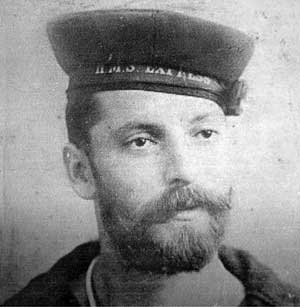
William Hunt - Hero of the Theatre Royal Fire
Born 10th May 1860 - 19th May 1936
Adapted from a family history article by Denise Hunt
Return to Exeter People Menu
Time was when a hero was someone who did something out of the ordinary for the greater good of others, often at great personal risk. Today, if you believe that the papers say, a hero is someone who paid very well to do a job that they are good at, certain sporting and entertainment “personalities” spring to mind! Many years ago long before I even thought of looking at my husband’s family history he showed me a photo of a bearded man in a sailors suit, he had been told that this was his great uncle William Hunt and he wondered if it was the same William Hunt who played an active role in the in the Theatre Royal Fire in Exeter on 5th September 1887.
William Hunt was born 10th May 1860 at Winkleigh, Devon, the son of William Hunt a carpenter, and Maria nee Webber. William one of five boys and one girl.
William Hunt joined the Navy, on 6th Jan 1879. By 1881 he was serving on HMS Iris. On 10th May 1881 William signed on for a further 10 years. He was 5ft 2 3/4 tall had dark brown hair, brown eyes and a fresh complexion, and his record shows that has a tattoo of a Coat of Arms on his left arm. Later records show that William signed on for further service in 1891 and at this time he is shown as being 5ft 5in. It would seem that William thrived in the Navy, being promoted and served on many ships including gunnery ships, where he is a gunnery trainer.
On 5th September 1887 William, who was home on leave from the Navy, he and his younger brother George arranged to meet at the Exeter Theatre Royal to see Romany Rye. He was staying with his father at Portland Street, Exeter having left HMS Iris, he was due to go back to HMS Express at the end of his leave.
In a contemporary newspaper article of the time William says "I was in the pit. My brother George left word on Sunday night that I was to meet him at the theatre, and I met him in the pit" The brothers watched the play until the 4th Act at which time the curtain was raised on a new scene and quickly dropped again – someone called out "Keep to your Seats". They were probably were mystified at this turn of events but then fire started to billow out around the curtain and smoke quickly filled the area. Later finding himself outside with his brother George, who had just left the Army, William decided to see if there was anything he could do. He went on to say "I then mounted one of the pillars outside the entrance and got onto the balcony" clearly William's agility from his years in the Navy stood him in good stead that night. He went to on assist in the rescue of several people, including a Miss Lear and the Misses Marks.
It was estimated that there were up to 2,000 people at the theatre that night, many others assisted in the rescues including Bombadier Francis Scattergood, a single man, who died from his burns that night on his way to hospital. George Hunt was reported as missing but was later found alive and well.
William Hunt was awarded a medal from the Royal Society for the Protection of Life from Fire, for The Bravery Act of the Year, while the Ally Sloper, a magazine popular at the time, also awarded him a medal. At that time he was promoted to Leading Seaman in the Navy and was granted permission to wear both medals on his uniform. He also received an award of £2.2.0. William Hunt left the Navy in May 1901.
William returned to Exeter and worked locally. In the June quarter of 1905 he married Frances Symes of Exminster, who was a nurse. They met when William was working for Hubbers Electricians as an electrician installing lighting at Digby Hospital.
The 1911 Census has William at 17 South Lawn Terrace, Heavitree he is aged 50 and is working for an electric light and telephone company, with him is his wife Frances 34 born Exminster, daughter Dorothy 4 bn Exeter, William’s mother in law Mary Lloyd Symes 67 bn Law Hitton Cornwall and Thomas Eastlake Gregory.
However the Navy was not finished with William – he was recalled to serve at the outbreak of WWI when he was in his mid fifties. He was away from his wife and young daughter Dorothy for over a year, only returning on sick leave. Once recovered he was posted to Dartmouth Royal Naval College as an instructor for the remainder of the War. It is said that one of the trainee cadets was the late Duke of Kent.
It is perhaps fitting that William is buried at the Higher Cemetery, Exeter along with his wife Frances; in that those who perished on that dreadful night and a fine memorial to those victims of the fire are also there. Surprisingly William Hunt has no gravestone, although Exeter City Council does now have a potted history of his life supplied by me, they had no idea that he was the same William Hunt.
Sources: Exeter Theatre Fire 2 booklets by Janet Henwood through the Devon Family History Society plus extensive family history research. With thanks to Denise Hunt.

│ Top of Page │